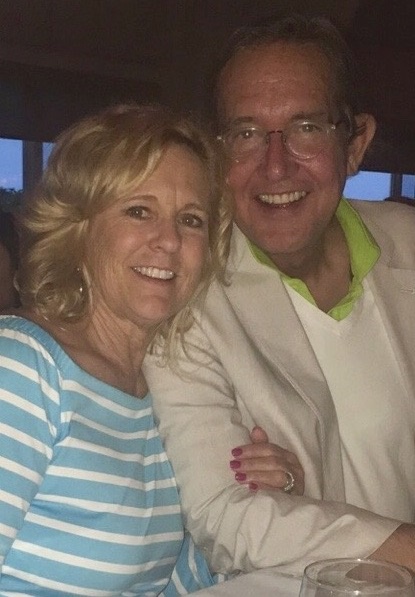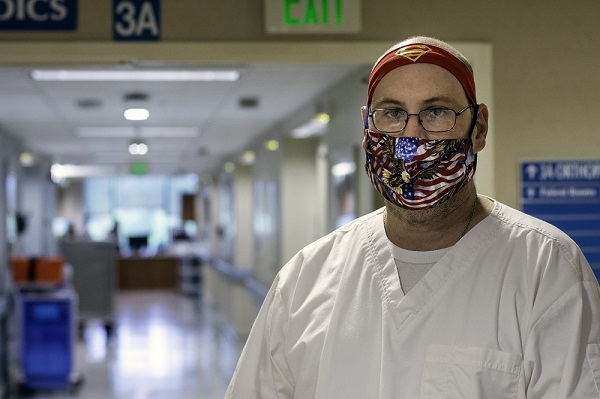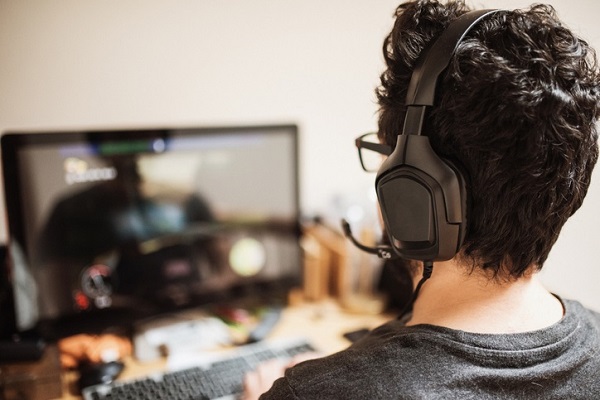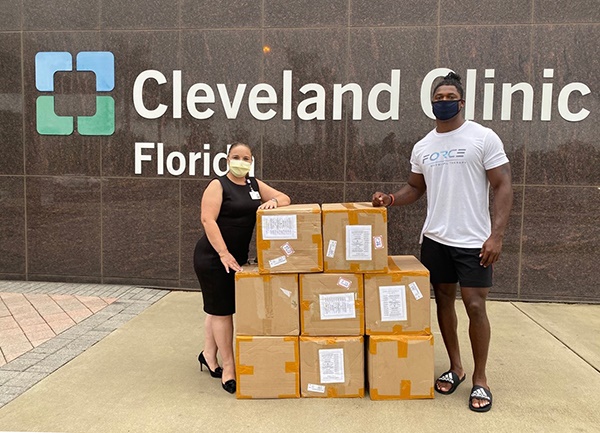Breathing Easy After Complex Surgery

Greg Church suspected it might be a long shot.
He needed a lung transplant because he has common variable immunodeficiency (CVID), a genetic disorder that impairs the immune system’s ability to fight infection. For individuals with CVID, recurrent and often severe infections primarily develop in the respiratory tract, as in Greg’s case, or the ears and sinuses.
With badly damaged lungs, Greg found himself in a catch-22 situation because CVID had compromised his immune system. Transplant recipients must take immunosuppressive medications for the rest of their lives to prevent organ rejection. Other healthcare systems already had informed Greg that he was an unacceptable transplant candidate because of CVID. Essentially, the very disease that made it necessary for a transplant was stopping him from getting one.
“I was on air tanks for about a year,” he says. “I knew I needed a transplant or I’d be gone.”
Greg, who lives near Philadelphia, called Cleveland Clinic and spoke with Marie Budev, DO, Medical Director of Cleveland Clinic’s lung transplant and heart-lung transplant program. Despite his high risk, she encouraged him to set up an appointment.
After two rigorous screening and evaluation visits at Cleveland Clinic, Greg was accepted as a lung transplant candidate and placed on the national waiting list.
Many Factors Lead to Transplant Success
Greg’s pulmonologist, Carli Lehr, MD, says the lung transplant team meets weekly to discuss patients who are potential candidates for transplant: Would a transplant help them? Are they well enough to survive a transplant? Are they sick enough to need one?
“Greg was certainly sick enough to need a transplant,” says Dr. Lehr, but notes that a successful transplant isn’t just about the medical part. “There’s the unmeasurable side of it – the grit, the willingness to do all the things you need to do even when it’s hard,” she says. “In spite of having a disease that affects a lot of different organs, Greg was still very strong and he had a lot vitality. Those things really led us to believe, correctly, that he would do well with a transplant.”
“Hearing that I was a candidate for surgery was almost bittersweet,” Greg says. “I knew that I was going to have major surgery, even with a disease that could affect my recovery, but the sweet part was that at least I’m capable of getting the chance.”
Just eight days after being put on the transplant list, Greg’s phone rang at 6:30 a.m. “I’d just poured a cup of coffee,” he recalls. “They said, this is Cleveland Clinic and we have lungs for you.”
Greg admits that the entire surgical process was kind of a blur. “It was wild. It was just like, oh my gosh, we weren’t expecting the call so soon. It really happened so quickly. I have a big chest cavity and I’m tall. Somebody matched me who had big lungs.”
Following the eight-hour surgery on March 10, 2019, Greg had complications with his medication. “I was in the hospital until July. I wasn’t adapting as quickly as they’d hoped. I have a wacky immune system so it’s not unexpected. Maureen, my wife, stayed in the hotel in Cleveland the whole time,” Greg says.
“That four months was tough but besides that, it was great,” he says. “Someone was always there to help me. Dr. Lehr was always there; she knew I was going stir-crazy.”
“This place is truly special”
Today, Greg’s new lungs are healthy and he’s doing well during the pandemic. “I’ve stayed fairly quarantined,” he says. “I wear a mask and gloves if I have to go out. We do Zoom calls with Dr. Lehr.”
In gratitude to Cleveland Clinic, Greg, who retired early from his successful investment advising practice, and Maureen have given funds to endow the Gregory and Maureen Church Term Chair in Lung Transplantation Research. The first chairholder is Dr. Lehr.
“When I was in the hospital, I told myself I had to do something,” Greg says. “I just know that this place is truly special and can help other people the way they helped me. I got to see a granddaughter born. If I didn’t have these lungs, I’d be 6 feet under.”
When Dr. Lehr learned of Greg’s gift, she was stunned. “When you walk with somebody through the transplant process, meaning that you see them before transplant, at transplant and after transplant, just seeing them do well is such a gift,” she says. “I was just really blown away by his generosity.”
The funds from the endowed chair will further Dr. Lehr’s lung transplant research. “When patients are deemed a candidate for transplant, they go on a nationwide waiting list. Because there is a shortage of donors, there’s always a certain number of people on the list every year who don’t get organs,” she says. “A lot of my work is trying to make sure that people who are underrepresented or disadvantaged or have severe disease are getting an equal shot at getting a transplant. I also help people who are on the list to get appropriate access to transplant, which means making sure we can identify the people who are sick enough to need a transplant and those who may have some more time, so we avoid needless deaths of those on the wait list.”
Greg says it was an easy decision to give back to Cleveland Clinic. “I’m very thankful. I’m just so very thankful,” he says. “This is a small way for me to express that.”
How You Can Help
Gifts of all sizes make a difference to researchers like Dr. Lehr. Grants often have very specific requirements and philanthropy helps scientists fill in the funding gaps that are not covered. Learn how your generosity can help further scientific investigation.
Beating COVID-19: A Nurse’s Personal Experience

On a beautiful day in late April, dozens of caregivers assembled outside Cleveland Clinic Martin North Hospital in Stuart. There to support one of their own, they wore masks, held balloons and carried homemade signs while members of the Martin County Sheriff’s Office and Stuart Police Department prepared to escort a patient home from the hospital.
The crowd cheered loudly as Dan Rice, RN, a nurse with Cleveland Clinic Martin Health, emerged through the doors, having been discharged from the hospital after battling COVID-19.
Prior to his hospitalization a couple of weeks earlier, Rice’s immune system had already been compromised due to treatments for allergies, an asthma attack and a sinus infection in March and early April. It was after midnight on April 11 when he began feeling disoriented, confused and had a temperature of 103.4 degrees. He wakened his wife and they rushed to the emergency department at Martin South Hospital, where he was diagnosed with COVID-19.
“Within 12 hours of my admission, I was in ICU,” Rice recounts. “Then a day and a half later, I was intubated. Then I went into ARDS, which is very, very advanced respiratory distress, but I got great care and was able to pull through.”
On April 13, a tube was placed into his windpipe to help him breathe. He was then transported to Martin North Hospital and remained in a medically induced coma for more than a week. When the tube was removed on April 24, Rice was able to speak with his family over a video phone call.
“I was very confused the day they woke me up, but I was alert and able to talk to my wife,” he said. “She got the kids on the phone and they were able to talk to me, and so that was a huge relief.”
In addition to the confusion, Rice’s body was in a weakened state. When physical therapists evaluated him on April 25, he was unable to stand and had lost 18 pounds of muscle mass. Realizing how much independence he’d lost was the most frightening part of his entire experience, he says.
He trusted his rehab team, but still worried about potential setbacks. “I’m a big guy,” he says. “If I fall, I fall hard.”
Rice acknowledges going through an emotional downturn around this time. On April 29, when he was discharged and saw the crowd cheering him on, “it really lifted my spirits.”
The support of his colleagues and of Cleveland Clinic Martin Health was not limited to just one day. During his hospitalization, Rice notes, “so many people reached out to my wife that she lost track of who was doing what because there was that much support.”
From lawn maintenance to donations of pet food to financial support, his fellow caregivers “were jumping in and helping, and that means a lot,” Rice says.
He continued his recovery at a rehabilitation hospital in Stuart until he was strong enough to do so from home. He then worked with Martin Health physical therapists three days a week to build up his strength.
Rice completed physical therapy on June 5 and returned to work the next day. He says that the life-threatening illness has given him new insight into how to interact with patients.
“I always try to give my patients the best possible experience, but this really helps me understand more.”
Rice hopes that people understand how contagious this virus is, and how it can affect people in a variety of ways. He urges people to take the necessary steps to help protect themselves and others from it.
“People need to wear their masks when they’re out in public,” he stresses. “If people are out walking around with the virus and don’t know, they’re spreading it. So that’s my advice for the community: put the mask on.”
Enterprising Teen Raises Funds for Frontline Caregivers

As the summer of 2020 loomed ahead, 16-year-old Kabir Gulati and his friends wrestled with the same feelings: boredom, isolation, and uncertainty about the future because of the COVID-19 pandemic.
Both of his parents are physicians, so Kabir was quite aware of the impact COVID-19 was having on healthcare workers – but he wasn’t sure his friends were. Inspired by a school fundraiser, Kabir decided to host an online gaming tournament to increase awareness about the health crisis among teens and raise funds to support frontline caregivers at Cleveland Clinic.
Using a popular online game for multiple players, Kabir created a tournament with a $5 entry fee. As an incentive, he provided 20% of the proceeds as prize money, to be split among the top three solo and duo players. Much to his delight, news about the tournament spread quickly, thanks to social media.
“There were players from Chicago, Florida, California, India, Switzerland, the UK, South America and Mexico,” Kabir says. “The number of players just kept growing. It was crazy!”
Thanks to his network, Kabir enlisted the support of Denver Nuggets player, Mason Plumlee, who tweeted about the tournament. As a special bonus, the basketball star then participated in a Zoom call from the NBA bubble in Orlando to congratulate the winners and thank them for supporting the cause.
More than 200 participants supported the fundraising effort on July 25, resulting in a $1,200 donation to Cleveland Clinic COVID-19 frontline caregivers.
“It was the first fundraiser I’ve ever done,” Kabir says. “It helped build crucial skills like brainstorming, creative thinking, organizing, networking, advertising, the art of persuasion, and time management. I’m already planning another one. It was a great opportunity, and I hope others are inspired to do something similar in their communities for what’s going on now.”
Interested in hosting a virtual fundraiser to benefit Cleveland Clinic like Kabir did? Contact the Community Events team to learn more.
Playing Defense for Florida Frontline Caregivers

As a defensive end for the NFL’s Indianapolis Colts, Al-Quadin Muhammad knows a thing or two about being part of a team and overcoming offensive opponents.
So when COVID-19 began impacting healthcare workers at Florida hospitals, this former University of Miami football standout decided to make a play. Al-Quadin contributed to Cleveland Clinic Florida’s COVID-19 Emergency Response efforts with a donation of 3,000 KN-95 masks to help keep caregivers safe from contracting the virus.
“I have roots in Florida from when I played college football for the University of Miami,” Al-Quadin says. “I donated the KN-95 masks because it’s a privilege to be able to give back and provide assistance during a critical time like this. I specifically chose to support Cleveland Clinic Florida because it’s a top hospital that’s delivering excellent care in South Florida.”
How You Can Help
Your gift to the COVID-19 Emergency Response immediately supports front-line caregivers and funds critical research and treatment to help combat COVID-19.

